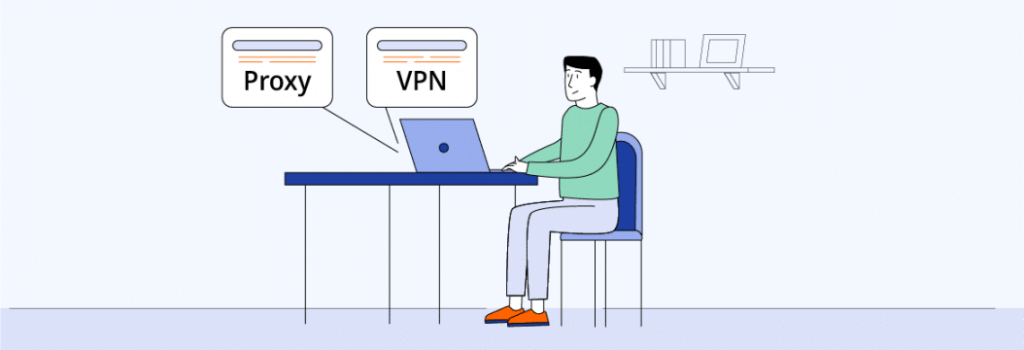While proxies and VPN servers aim to enhance privacy, they do so through distinct methods. When considering the capabilities of proxies versus VPNs, the key distinction lies in their roles: proxies primarily serve as intermediaries between users and the internet, while VPNs establish an encrypted tunnel through which all traffic from the user’s device passes, effectively safeguarding network security.

What is a Proxy Server ?
A proxy server acts as an intermediary between a user’s device and the internet. When a user sends a request to access a website or online service, it first goes through the proxy server instead of directly reaching the destination server. The proxy server then evaluates the request and forwards it on behalf of the user, interacting with the destination server as if it were the user’s device.
Proxy servers serve various purposes, including enhancing privacy, security, and performance. They can hide the user’s IP address, making their online activities more anonymous. Additionally, proxies can bypass geo-restrictions by accessing content from different regions.
From a security standpoint, proxy servers can filter incoming and outgoing traffic, blocking malicious content, and preventing unauthorized access to sensitive information. They can also cache frequently accessed data, improving network performance and reducing bandwidth usage.
What is a VPN ?
A VPN, or Virtual Private Network, is a technology that creates a secure, encrypted connection over a public network such as the internet. It allows users to access the internet securely and privately by routing their internet traffic through a remote server operated by the VPN provider. This encrypted tunnel protects user data from interception and surveillance, enhancing privacy and security online.
You may need a VPN in several situations:
- Secure Remote Access: If you work remotely or need to access sensitive company resources from outside the office, a VPN can provide a secure connection to your organization’s network, protecting data from unauthorized access or interception.
- Public Wi-Fi Security: When connecting to public Wi-Fi networks in places like cafes, airports, or hotels, your data is vulnerable to interception by hackers. Using a VPN encrypts your internet traffic, preventing unauthorized access to your personal information, passwords, and sensitive data.
- Bypassing Censorship and Geo-Restrictions: VPNs allow you to bypass censorship and access blocked websites or services in countries where internet access is restricted. They can also help you bypass geo-restrictions imposed by streaming platforms, allowing you to access content from different regions.
- Enhanced Privacy: VPNs mask your IP address and encrypt your internet traffic, making it difficult for ISPs, advertisers, and government agencies to track your online activities. This enhances your privacy and anonymity online, protecting your personal information from prying eyes.
- Torrenting and P2P File Sharing: VPNs provide a secure environment for torrenting and peer-to-peer (P2P) file sharing by hiding your IP address and encrypting your traffic. This protects you from copyright trolls, ISP throttling, and legal consequences associated with torrenting copyrighted content.
What are the differences between a proxy server and vpn ?
The main differences between a proxy server and a VPN lie in their functionality, security features, and the level of privacy they offer:
Functionality:
- Proxy Server: A proxy server acts as an intermediary between a user’s device and the internet. It relays internet requests on behalf of the user, allowing them to access websites and online services. Proxies can be configured to route specific types of internet traffic, such as HTTP, HTTPS, FTP, or SOCKS, and they can be used for various purposes like web browsing, web scraping, or accessing geo-restricted content.
- VPN (Virtual Private Network): A VPN creates a secure and encrypted connection, or tunnel, between the user’s device and a remote server operated by the VPN provider. All internet traffic routed through this tunnel is encrypted, protecting it from interception and surveillance. VPNs provide a secure and private connection to the internet, enhancing privacy and security for the user.
Security Features:
- Proxy Server: Proxies may offer some level of anonymity by hiding the user’s IP address, but they do not encrypt internet traffic. As a result, data transmitted through a proxy server is not fully protected from interception and may be vulnerable to surveillance or hacking.
- VPN: VPNs encrypt all internet traffic passing through the VPN tunnel, ensuring that user data remains secure and protected from interception. VPNs also mask the user’s IP address, enhancing anonymity and privacy online.
Level of Privacy:
- Proxy Server: Proxies offer limited privacy protection since they do not encrypt internet traffic. While they may hide the user’s IP address, data transmitted through a proxy server is not fully secure or private.
- VPN: VPNs provide a higher level of privacy by encrypting all internet traffic and masking the user’s IP address. This ensures that user data remains confidential and protected from surveillance, enhancing privacy and anonymity online.
In summary, while both proxy servers and VPNs serve as intermediaries between users and the internet, VPNs offer a higher level of security and privacy by encrypting internet traffic and providing a secure, private connection to the internet.